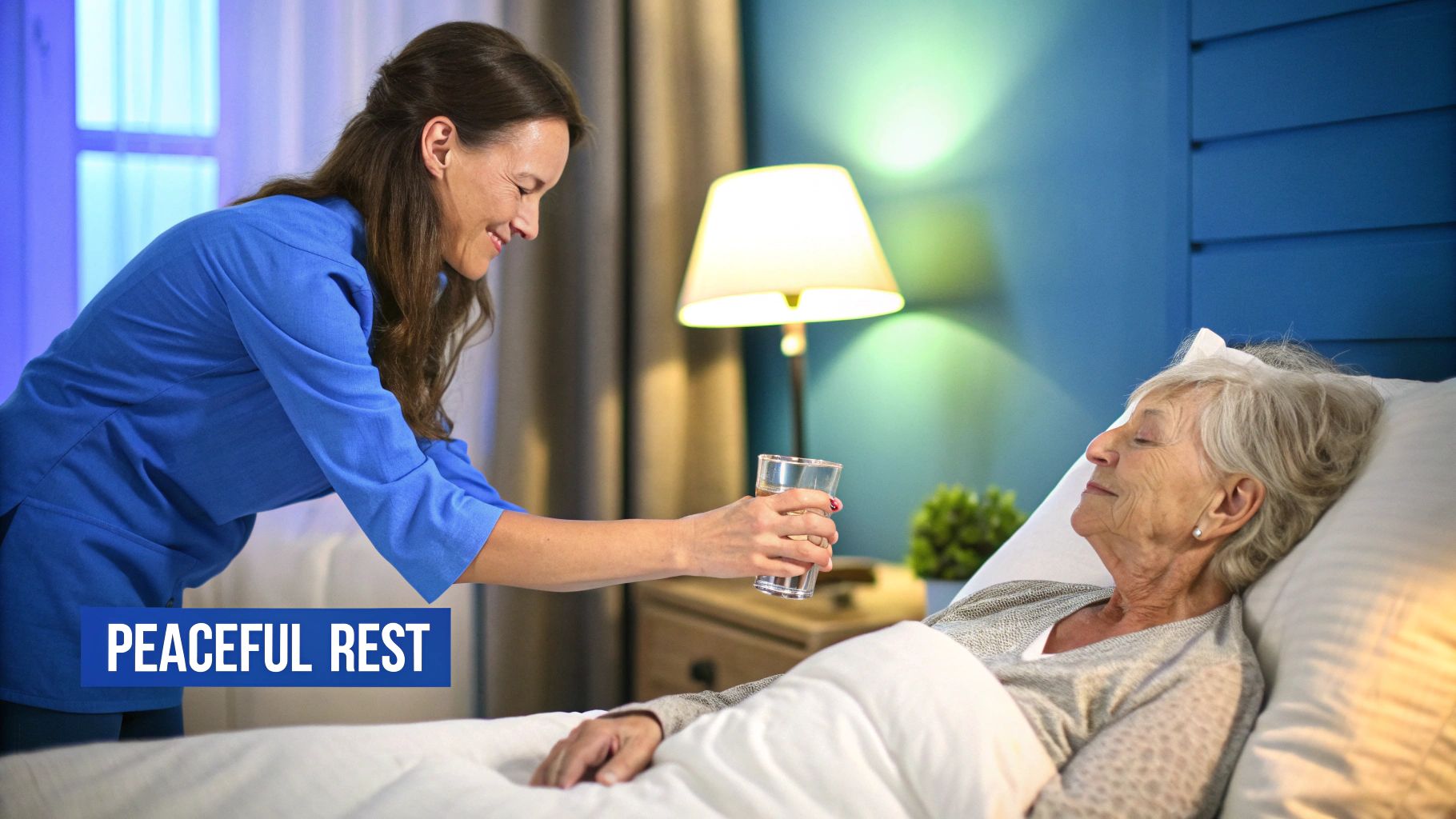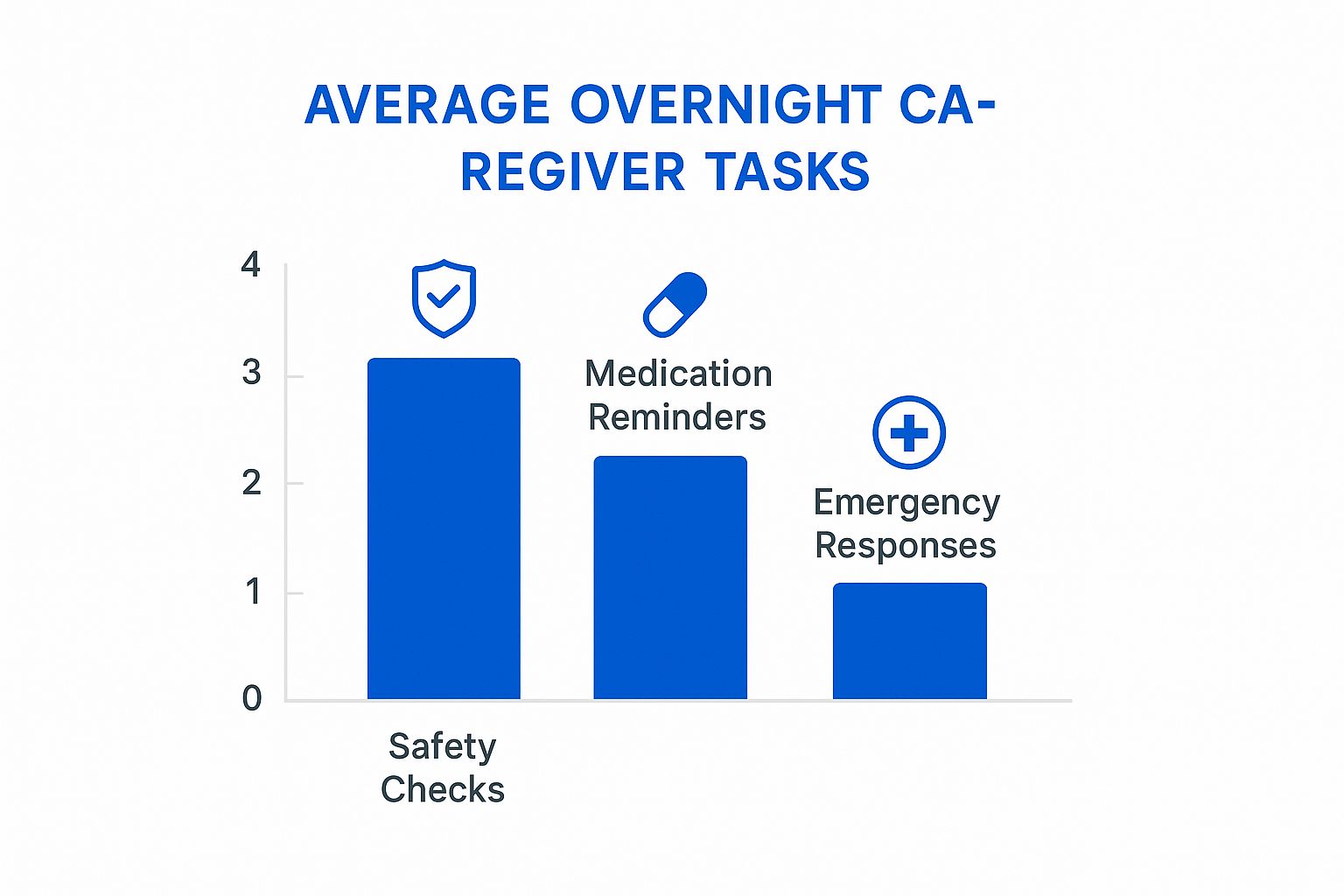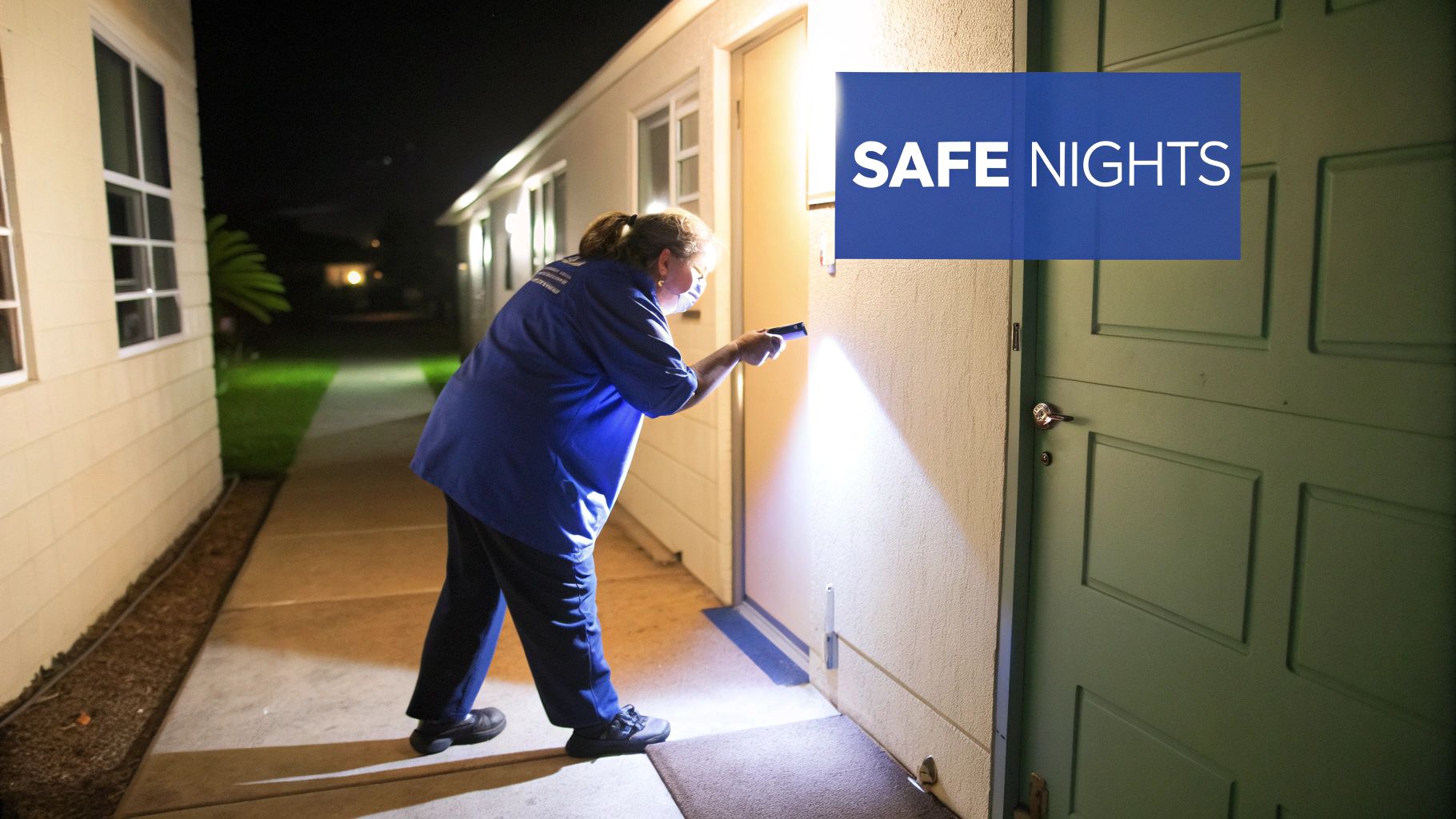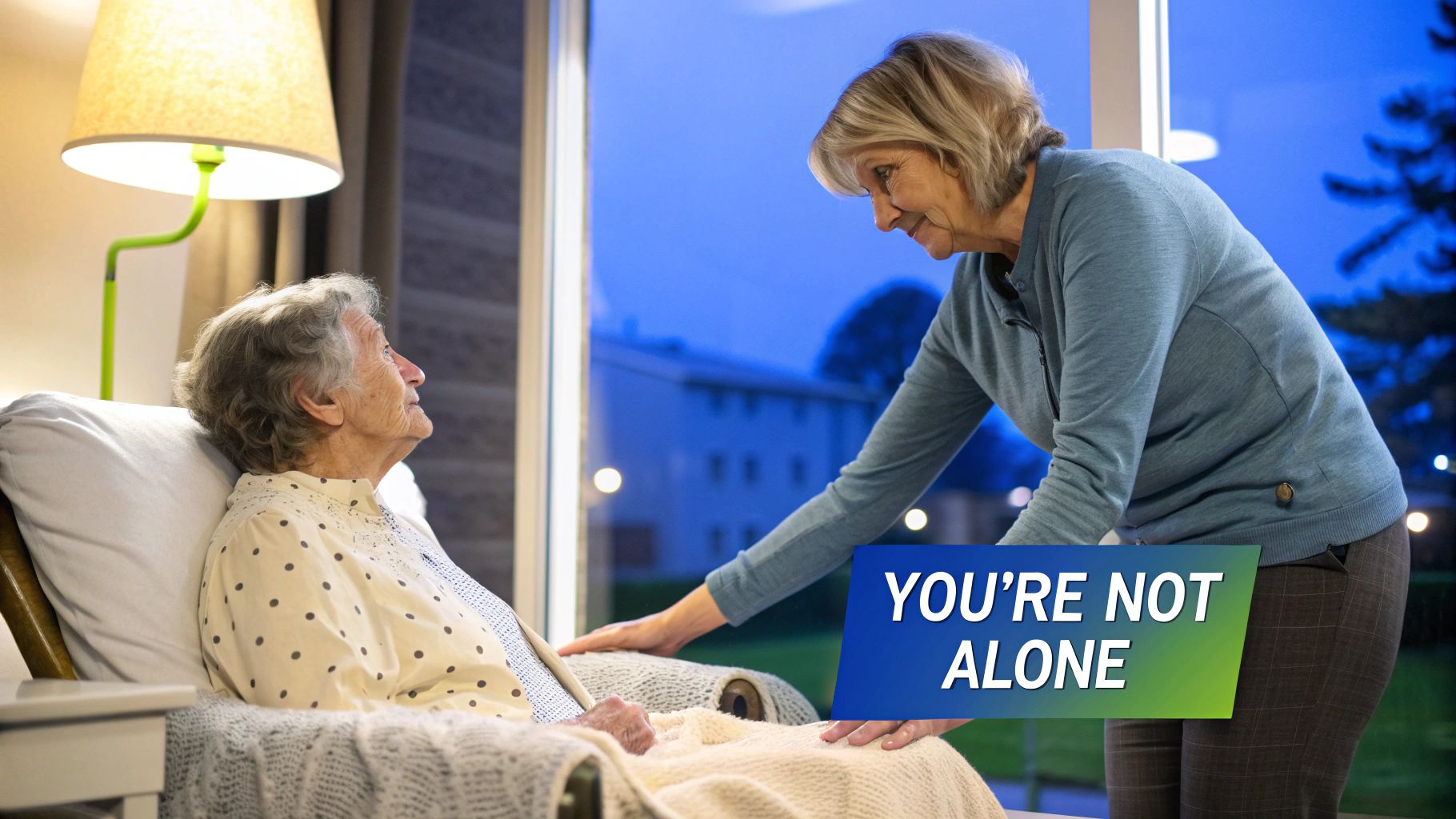Overnight care is exactly what it sounds like: a professional caregiver stays in the home through the night to provide support. Think of it as a dedicated 'night watch' for your loved one, ensuring they're safe, comfortable, and looked after while the rest of the family can finally get some deep, uninterrupted sleep. For many families juggling the demands of elder care, this service is an absolute lifeline.
What Is Overnight Care and Who Is It For?
The hours between dusk and dawn can be some of the most difficult for older adults and their family caregivers. During the day, there's usually a routine and plenty of activity. But the quiet and darkness of night can often magnify anxiety, confusion, and physical risks.
Overnight care is specifically designed to bridge this gap. It puts a watchful eye and a helping hand in the home precisely when it’s needed most.
Imagine a caregiver quietly present, ready to help your mom with a late-night trip to the bathroom, preventing a dangerous fall in a dimly lit hallway. Or picture someone there to offer a calming word to your dad if he wakes up confused or agitated. That’s the heart of what overnight support provides.
When Does Nighttime Become a Concern?
For some families, overnight care moves from a "nice-to-have" to a true necessity for keeping a senior safe and well at home. This kind of support often becomes critical for individuals in a few key situations.
Let's look at a few common scenarios where overnight care can make all the difference.
Common Scenarios Requiring Overnight Care
| Situation | Primary Concern | How Overnight Care Helps |
|---|---|---|
| Recovery from Surgery | Limited mobility, pain management, and risk of injury when trying to get out of bed. | The caregiver assists with safe transfers, manages discomfort, and helps with medication schedules. |
| High Fall Risk | Navigating the home in the dark, especially for bathroom trips. Balance issues are more pronounced at night. | A caregiver provides steady physical support for walking, reducing the chance of a fall. |
| Dementia & Alzheimer's | "Sundowning" (evening agitation/confusion), wandering, and disrupted sleep patterns. | The aide offers gentle redirection, prevents unsafe wandering, and provides a calming presence. |
| Chronic Illness Management | Conditions like COPD or diabetes may require monitoring or assistance with medical devices overnight. | A trained caregiver can help manage oxygen, check blood sugar, and respond to any alerts. |
A staggering one in four older adults falls each year, and the risk skyrockets in the dark. For those with dementia, the statistics are just as concerning—6 in 10 are prone to wandering, a behavior that often peaks at night. An overnight caregiver directly addresses these risks.
For so many families, the biggest benefit isn't just the physical help—it's the profound peace of mind. It replaces that constant, nagging worry and sleepless nights with the reassurance that a professional is standing guard, ready to handle whatever comes up.
Ultimately, this service is a support system for the entire family. It allows primary caregivers to finally rest, recharge, and be at their best during the day. You can learn more about how our compassionate team provides this support by checking out our NJ Caregiving guide.
The Growing Need for Specialized Elderly Care

If you're looking into overnight care for an aging parent or loved one, you're not on this journey alone. Not by a long shot. What feels like a very personal, private decision is actually part of a massive national trend, one that's quietly reshaping how families care for their elders.
This isn't a coincidence. The rising demand for this kind of support is being driven by two major forces happening at once. First, we have a historic demographic wave—an entire generation is aging. At the same time, there's a powerful cultural shift in how we view the later chapters of life, with an overwhelming desire to stay home.
Together, these trends are turning specialized services like overnight care from a niche option into an absolute necessity for countless American families.
The Aging of a Generation
The biggest piece of the puzzle is the aging of the Baby Boomer generation. This enormous group of people is now reaching their senior years, creating a surge in the number of older adults who need some form of help.
This isn't some far-off prediction; it's our current reality. By 2030, we'll hit a major milestone: one in five Americans will be 65 or older. That demographic boom naturally ramps up the need for all kinds of elder care, especially the kind that helps people stay independent in their own homes.
The sheer scale of this is hard to wrap your head around. The number of adults aged 65 and over is projected to jump from 57.8 million in 2022 to nearly 89 million by 2060. That's a huge strain on families and our existing care systems.
The Powerful Desire to Age in Place
On top of the raw numbers, there's a deeply human element: most seniors want to stay right where they are. The idea of "aging in place" isn't just a casual preference; for many, it's about dignity, comfort, and staying connected to a lifetime of memories.
Study after study confirms it. Older adults would much rather stay in their familiar homes than move to an assisted living facility or nursing home. In fact, a staggering 75% of Americans aged 50 and older say they want to age in place. You can read more about these home health care industry trends to see just how strong this preference is.
This creates the core challenge for so many families today: how do you honor your loved one's wish to stay home while making sure they're safe, especially through the vulnerable nighttime hours? This is exactly where professional overnight care for elderly individuals becomes so vital. It’s the bridge that connects the desire for independence with the need for safety.
What an Overnight Caregiver Actually Does
When you first hear "overnight care," it’s easy to picture someone just sitting quietly in a chair, keeping watch while your loved one sleeps. And while that watchful presence is definitely part of the job, an overnight caregiver’s role is so much more active and involved. They are a hands-on support system, ready to step in at a moment's notice to ensure safety, comfort, and peace of mind during the night.
Think of them as a personal safety net, there to catch any issues—big or small—before they become real problems. Their work is a delicate balance of proactive monitoring and compassionate, immediate help.
Proactive Safety and Mobility Support
One of an overnight caregiver's most critical jobs is preventing nighttime falls. Getting up to use the bathroom in the dark is a major fall risk for seniors, and a caregiver provides that steady arm to lean on, making sure the path is clear and well-lit. This simple act can make all the difference.
This kind of support also includes smaller, but equally important, tasks like helping a loved one change positions in bed to prevent painful pressure sores or just getting them a glass of water. It’s all about addressing those little needs before they can turn into something more serious.
This infographic shows some of the most common things a caregiver does during an overnight shift.

As you can see, routine safety checks and medication reminders are quite common. Thankfully, emergency responses are rare—and that’s often because this proactive care helps stop emergencies from happening in the first place.
Active Assistance and Emotional Reassurance
Beyond just physical safety, overnight caregivers handle crucial health and personal care tasks. These often include:
- Medication Management: Making sure any medications scheduled for late evening or the middle of the night are given correctly and on time.
- Incontinence Care: Providing discreet and dignified help with changing adult briefs or managing catheter needs. This is vital for maintaining good hygiene and skin health.
- Companionship: For seniors who experience anxiety, confusion, or "sundowning" at night, a caregiver offers a calming presence. Sometimes, a gentle voice and a little reassurance are all it takes to help them settle back down and fall asleep.
The role is deeply personal and adapts to whatever your loved one’s specific challenges and routines are throughout the night.
Two Models of Overnight Support
It's really important to know that overnight care isn't a one-size-fits-all solution. There are two main approaches, and the right one for your family will depend on your loved one’s specific needs.
The key difference comes down to this: is the caregiver expected to be awake for the entire shift, or are they allowed to sleep but remain on-call? This choice affects both the cost and the level of support provided.
Let's break down the two models.
The two main types of overnight care offer different levels of support tailored to different needs. Understanding these distinctions is key to finding the right fit for your loved one.
Comparing Types of Overnight Care Services
| Service Type | Caregiver Status | Best For Seniors Who… | Typical Services Provided |
|---|---|---|---|
| Active Awake Care | Awake and alert for the entire 8-12 hour shift. | Have significant needs, are a high fall risk, wander due to dementia, or require frequent medical attention. | Constant monitoring, frequent bathroom assistance, repositioning, medication administration, immediate response to any need. |
| Inactive On-Call Care | Provided a place to sleep but available to wake up and assist as needed. | Are more independent but need the security of having someone present for emergencies or occasional help. | Assistance with 1-2 nighttime needs, emergency response, providing peace of mind, light assistance if woken up. |
Choosing between an active or on-call caregiver really hinges on how much hands-on help is needed.
Understanding what an overnight caregiver actually does is the first step. Once you see how this specialized support works, you can start to see how it can transform nighttime from a time of stress and worry into a time of genuine rest for your entire family.
The Benefits for Seniors and Their Families

Bringing in overnight help for a loved one does more than just fill the dark hours. It brings a profound sense of relief and stability that ripples through the entire family, restoring balance and allowing everyone to finally breathe a little easier.
The most immediate benefit is for the senior themselves: they get to stay right where they want to be—in their own home. This emotional security is huge. But it’s also paired with a major boost in physical safety. With a trained caregiver close by, the risk of a nighttime fall, one of the most common causes of serious injury for older adults, drops significantly.
This consistent support also leads to better health overall. A professional can ensure medications are taken on schedule and help with personal needs like incontinence with dignity and skill. This kind of attentive care helps prevent small issues from becoming bigger problems and gives seniors the comfort of knowing they aren’t alone if they wake up feeling anxious or confused.
Restoring Peace of Mind for Caregivers
For family caregivers, the impact of overnight care for elderly relatives is often life-changing. It’s a direct answer to caregiver burnout, that state of physical and emotional exhaustion that comes from being constantly “on.” The need to always be listening for a sound in the night takes a serious toll.
Getting a full, uninterrupted night of sleep isn't a luxury; it's a necessity for providing effective care during the day. This respite allows family members to recharge, reducing stress and improving their own health and well-being.
Hiring overnight help can actually help restore the family dynamic. Instead of being a tired, stressed-out caregiver 24/7, an adult child can go back to simply being a son or a daughter. This shift allows for more positive, meaningful time with their parent, strengthening a relationship that may have become strained under the pressure of constant care. You can find more information about fostering these supportive relationships in our NJ Caregiving resources.
Think about Sarah and her father, Mark. For months, Sarah slept on a couch near his room, waking up several times a night to help him. She was exhausted, and their relationship grew tense. After bringing in an overnight caregiver, Sarah could finally sleep soundly in her own bed again. She woke up refreshed, and her time with Mark became about connecting, not just caregiving. That one change made a world of difference for them both.
Understanding the Costs of Overnight Care
When you start arranging overnight care for a family member, the costs can feel like you’re trying to decipher a completely foreign language. The truth is, the nighttime hours come with their own unique set of expenses.
For instance, you'll find that caregivers either charge by the hour or offer a flat rate for an entire night shift. Understanding the difference is key to managing your budget and ensuring your loved one gets the quality of care they need.
- Hourly Rates track the exact time a caregiver is on duty, often billed down to 15-minute increments.
- Flat Fees cover a full overnight shift, usually 8–12 hours. This can make budgeting simpler, but sometimes the hourly breakdown ends up being a bit higher.
The cost also shifts dramatically depending on where you live and the complexity of care required. You might find lower hourly rates in a rural area, but limited availability could force you into paying for a minimum number of hours per shift.
Pricing Models And Regional Differences
Think about a major metropolitan area where the demand for night caregivers is high. It’s not uncommon to see rates climb above $40 per hour, especially during peak seasons. This is why planning ahead and getting a few different quotes is so important.
Across the country in 2025, the national average for in-home care is hovering between $25 to $35 per hour. Of course, this number moves around based on the region, the level of care needed, and the caregiver's qualifications. Many agencies will offer a slightly lower hourly rate for longer shifts—like 8, 12, or even 24 hours—which can make overnight care more manageable, though it's still a significant investment. Read the full research about in-home care costs in 2025
Here’s a quick breakdown of what shapes the final price:
- Location: Urban areas almost always come with premium pricing.
- Care Complexity: If medical tasks are involved, expect the hourly cost to go up.
- Shift Length: Booking longer blocks of time can often bring the per-hour fee down.
- Agency vs. Independent: Hiring an independent aide might seem cheaper upfront, but you'll be responsible for handling their taxes and liability insurance.
Funding Options For Overnight Care
At first glance, it might seem like private funds are the only way to cover home care costs. The good news is that insurance and government programs can often step in to bridge a significant part of the gap.
If you have a long-term care insurance policy, check to see if it includes benefits for home care—it often covers overnight support. For veterans, the Aid and Attendance benefit is specifically designed to help cover the costs of nighttime assistance.
Medicaid coverage varies quite a bit from state to state, but for eligible seniors, it can cover the costs entirely. There's also talk of expanding Medicare, which could potentially extend in-home care subsidies to 5.7 million more seniors.
Key insight: The best strategy is often to combine multiple funding sources. This can reduce your out-of-pocket expenses and help secure consistent, reliable overnight support.
Mapping out your budget by mixing and matching these funding streams can turn what feels like an overwhelming expense into a manageable plan.
A good place to start is by getting quotes from a few local agencies and taking a close look at any long-term care policies you already have. From there, get in touch with your state's Medicaid office or a local veteran affairs office to see what you might be eligible for.
Getting a handle on the costs of overnight care early on doesn't just make financial sense—it gives you peace of mind and lets you focus on what really matters: spending quality time with your loved one.
How to Choose the Right Care Provider

Choosing the right provider for overnight care for elderly loved ones is a huge decision, and it’s one of the most important your family will ever make. This isn't just about qualifications on a piece of paper; it's about finding a partner you can trust to provide compassionate, reliable support during the vulnerable nighttime hours.
Think of it like hiring a key member of your team. You absolutely need to check their skills and background, but you also have to make sure they're a good fit for your loved one's personality. A caregiver's ability to build a warm, genuine connection is just as critical as their professional certifications.
Your Vetting Checklist
When you start interviewing agencies, it pays to have a clear set of questions ready. This helps you gather the same information from everyone, making it much easier to compare your options fairly. A structured approach will take you from the initial research phase to a confident decision.
Make sure you ask every potential provider these essential questions:
- Screening and Background Checks: What is your screening process for caregivers? Can you walk me through what your background checks include, and how often are they updated?
- Training and Certifications: What kind of specialized training do your overnight caregivers have, especially for things like dementia care or helping with mobility?
- Insurance and Bonding: Is your agency fully insured and bonded? Are your caregivers covered as well? I'd like to see proof of this coverage.
- Emergency Protocols: What’s your plan if there's a medical emergency in the middle of the night? How and when are family members notified?
Peace of mind really comes from knowing an agency has solid safety protocols in place. A reputable provider will be completely transparent about their screening, insurance, and emergency plans. In fact, they'll welcome these questions because it shows you're doing your due diligence.
Beyond the Paperwork
While credentials and background checks are non-negotiable, the human element is just as important. The best overnight caregiver isn't just someone with the right skills—it's someone whose personality clicks with your loved one.
Always arrange a "meet and greet" before you sign any agreement. Watch how the potential caregiver interacts with your family member. Are they a good listener? Do they show patience, kindness, and respect? This first meeting can tell you more than any resume ever could. For more insights on creating a supportive care partnership, see our NJ Caregiving team's approach. Trust your gut instinct here; a strong, positive connection is the foundation of excellent care.
Got Questions About Overnight Care? We Have Answers
It's completely normal to have a few questions, even after you've weighed the benefits. Making a decision like this for your family is a big deal, and you want to be sure you've covered all the bases. Let's walk through some of the most common concerns that come up.
A major worry for many families is what happens if there’s a medical emergency in the middle of the night. You can rest easier knowing professional caregivers are trained to handle these exact situations. Their first step is always to assess what's happening, provide any immediate first aid they can, and call 911. From there, they follow strict agency protocols to notify family contacts, so you're kept in the loop from the very start.
How Do I Introduce a New Caregiver?
This is a big one. It's often tough to bring up the idea of overnight help with a loved one who's reluctant to accept it. The best approach is a gentle one.
Try framing the caregiver as a "nighttime companion" or a "helper" instead of someone who's there because they can't manage on their own. It also helps to explain how this benefits the entire family, giving you a chance to rest properly so you can be a better, more present caregiver during the day.
A quick, low-key "meet and greet" before the first official shift can work wonders, too. It gives your loved one a chance to get to know the caregiver in a relaxed way, laying the groundwork for trust and comfort.
What's the Difference Between Overnight and Live-In Care?
Many families get these two mixed up, but the distinction is important for getting the right level of support.
Overnight care is a specific shift, usually 8-12 hours, where a caregiver is awake, alert, and focused solely on your loved one’s nighttime needs. In contrast, live-in care involves a caregiver who lives in the home and has their own designated times for sleep and breaks, providing a round-the-clock presence but not necessarily active, awake care throughout the night.
Understanding these service models is key, especially as the global elderly care market—valued at a staggering $49.29 billion in 2024—continues to grow. Knowing exactly what you need helps you make the best choice for your situation. You can discover more insights about the elderly care market on fortunebusinessinsights.com.
At NJ Caregiving, we've heard every question and concern in the book, and we're here to help you find the answers. If you'd like to talk about your family's unique needs and figure out the right path forward, please visit us at njcaregiving.com.



